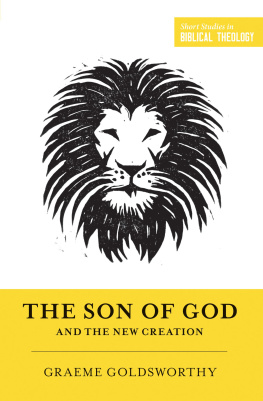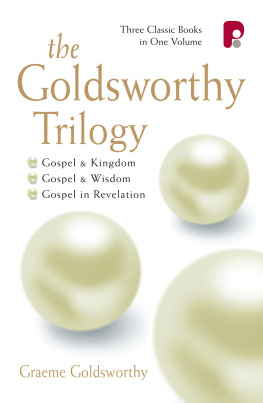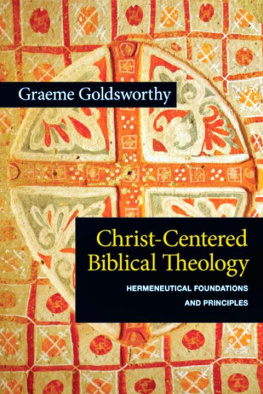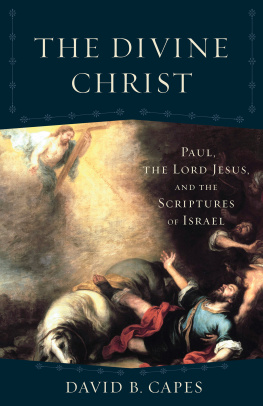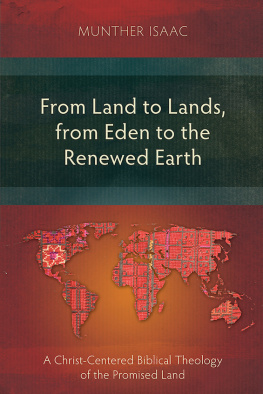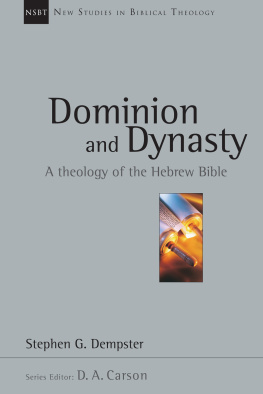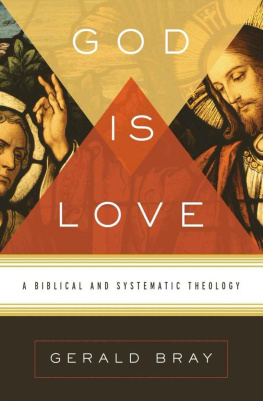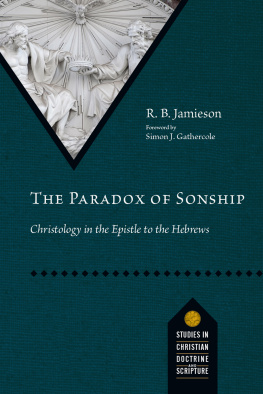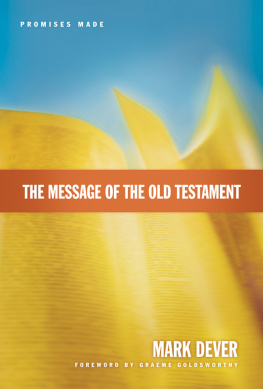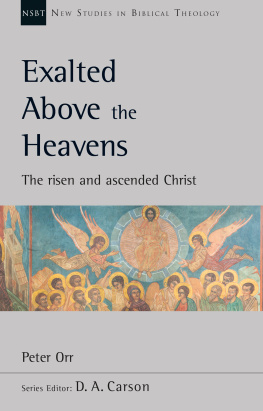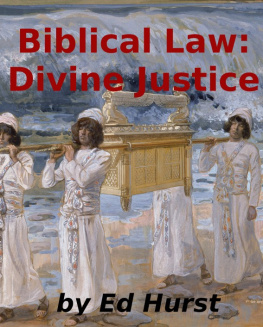Table of Contents
Landmarks
The Son of God
and the New Creation
Graeme Goldsworthy
Dane C. Ortlund and Miles V. Van Pelt,
series editors
To my grandchildren:
Jake Goldsworthy
Ethan Goldsworthy
Keira Goldsworthy
A Biblical-Theological Approach
The Bible begins in Genesis 1 and 2 with creation and ends in Revelation 21 and 22 with the new creation. That is the simple and direct way of describing the two ends of the biblical story. Between these bookends, in the story from Genesis 3 through to Revelation 20, we have the account of the fall of mankind, the consequent corruption of the universe, and the gracious work of God to redeem the situation.
Alpha and Omega: Christ and Creation
At the heart of this redemptive history is the towering figure of Jesus and his saving work through his birth, life, death, resurrection, and ascension. It is remarkable that one of the last words from the ascended Jesus himself is this self-description:
I, Jesus, have sent my angel to testify to you about these things for the churches. I am the root and the descendant of David, the bright morning star. (Rev. 22:16)
The testimony for the churches in these last days concerns Jesus as the Son of David. Why? After all, Scripture also testifies to the fact that Jesus our Savior is God from all eternity, the second person of the Trinity. Why, then, does Jesus focus on his human lineage as one of his last words in the great narrative of salvation?
A little before this, in Revelation 22:13, he has taken to himself the title of Alpha and Omega, previously applied to God in Revelation 1:8 and 21:6. Clearly, these two perspectives mean that we cannot avoid the fact that Jesus is true man and true God. Nor can we avoid the fact that we can never separate these two realities: Jesus goes on being identified as the God-man right through the redemptive story and into its eternal conclusion. In this study we will see this truth as it is revealed in the progress of the story from creation to new creation. At the heart of this story is Jesus, who is called the Son of God. In this study we shall see specifically how the Son of God is the author and mediator of a new creation .
There is a tendency among evangelical Christians to understand new creation in terms of individual regeneration, or If the broader new creation is thought of at all, it is often as something quite separated from our new birth. We think of new birth as a present reality and new creation as a future one. This separation is, I believe, a mistake. We may distinguish the two events, but we should not separate them. This, I trust, will become clearer as we pursue our study of son of God.
Words and Meanings
You are the Christ, the Son of the living God (Matt. 16:16). Peters confession received commendation from Jesus as having been revealed to him by my Father who is in heaven (v. 17).
But the title son of God seems to convey the idea that Jesus has a special relationship to God and that he may even be God himself. What should the title Son of God mean to you and me as it is applied to Jesus in the New Testament? What did Peter understand by the Son of the living God, and what was revealed to him by the Father in heaven? Did he mean by it the same as son of God?
The title Son of God clearly indicates a special relationship between Jesus and God the Father. At first it might seem reasonable to take this title as an indication of the Sons deity, the more so when we reflect on the fact that another title Jesus frequently applied to himself was Son of Man. On the surface the latter would seem most obviously to mean simply that he was human, since that is the literal meaning of the term.
But things are not always what they seem to be on first sight. This understandable assigning of meanings to the two titles at least has this to commend it: it seems to provide a way of engaging with the historic confession of the Christian church that Jesus is both truly God and truly man. Yet, for many, this understanding of Jesus having two seemingly incompatible natures is a difficulty and even a stumbling block. It seems to fly in the face of simple, rational logic to say that one and the same person can embrace two such complete but different natures in a way that compromises neither of them. The problem doesnt stop there. A school chaplain was once asked by a student, If Jesus is God, who looked after things up there while he was down here? Once we start to investigate the two natures of Jesus, the doctrine of the Trinity also comes into view. In fact, we could say that the gospel drives us toward the confession that God is triune. We confess that God is one, yet the Father is not the Son, and the Son is not the Father. Then we compound the problem by including the Holy Spirit, who is neither the Father nor the Son. Yet we are talking about the one indivisible God.
Investigating the title son of God, then, may seem to be a straightforward task involving the examination of each occurrence of the phrase in turn. But this would leave any possible synonyms untapped.
Furthermore, sonship is expressed by more than one Greek word in the New Testament, including huios, teknon, and pais. Pais is often translated as servant, and its application to Jesus does not appear to emphasize sonship but rather his role as obedient servant. The sonship word most frequently used of Jesus is huios . John uses teknon to refer to believers as sons of God, but this is surely not completely identical to the relationship that Jesus has with the Father (John 1:12; 1 John 3:12). Yet it certainly raises the question about the link between the sonship of Jesus and our sonship. We will reflect on the nature of our sonship in chapter 4 of this study.
The aim of this volume is to investigate the title Son of God and other related sonship titles in order to deepen our appreciation of the person and work of Jesus of Nazareth. We will see that we cannot study these titles of Jesus without becoming deeply and personally involved since we, as believers, are defined by our relationship to Jesus. But there are some pitfalls we must avoid. Studies that take up a particular biblical theme can either help us to focus on the sense of the overall unity of the Bible or, unfortunately, serve to isolate the chosen theme from that unity and thus undermine the very thing we want to understand. This mistake can result from an approach to word studies that suffers from the mistaken belief that a particular word or phrase is always used consistently and uniformly throughout Scripture, so that all we need to do is establish a kind of uniform dictionary definition. Focusing on a word or phrase also may easily overlook the same concept expressed by other words or phrases.
There are multiple mistakes, then, to avoid in a study such as this one. First is the notion that the chosen word or phrase always has the same meaning; second, that this meaning is only ever expressed by that one word or phrase. The matter is complicated by the variety of ways that words and phrases have come to be translated in the various English versions of the Bible. Sometimes important words or phrases used in earlier documents are picked up and repeated in later documents to make a significant link. A particular title, for example, may appear to be preserved in the actual words for a purpose.
So, for instance, son of man literally translates both the Hebrew and Aramaic expressions that mean human being. But translating the phrase as human being or mortal in Daniel 7:13 arguably obscures the reason for Jesus calling himself the Son of Man in many places in the Gospels (in which Jesus appears to be picking up the specific language of Daniel 7). The way he uses the term suggests that he is claiming to be the figure referred to by Daniel. And in Daniel, the son of man is not any mere mortal but a uniquely majestic figure. And yet in Ezekiel there are a number of references to son of man that designate the prophet himself as a human being (e.g., Ezek. 2:1, 3, 6, 8; 3:1). These are not references to the visionary man in heaven as they are in Daniel.

